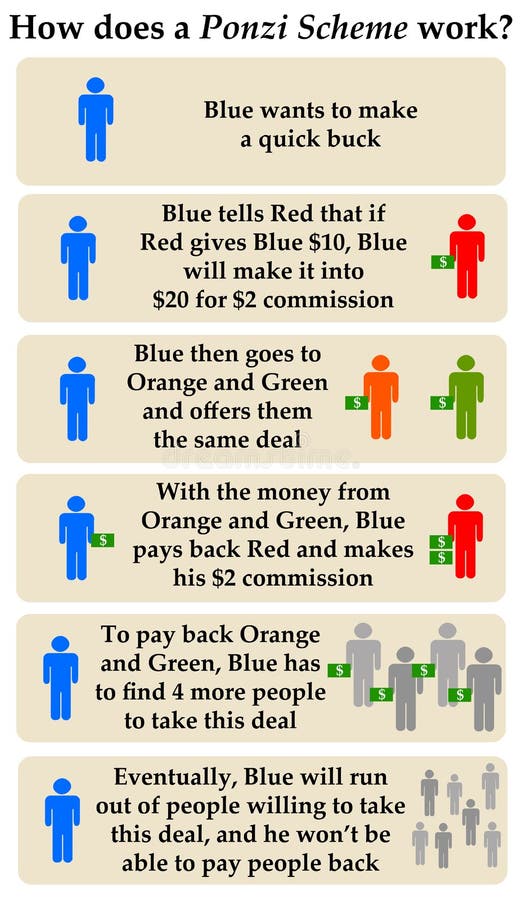A ponzi scheme is considered a fraudulent investment program. It involves using payments gathered from new financiers to pay off the earlier financiers. The organizers of Ponzi schemes usually promise to invest the money they gather to generate supernormal profits with little to no threat. Nevertheless https://www.audible.com/pd/Introducing-Tyler-Tysdal-Ty-Podcast/B08VG9GGC5, in the real sense, the fraudsters don't really plan to invest the cash.
As soon as the brand-new entrants invest https://www.podbean.com/podcast-detail/b5b53-139939/Tyler-Tysdal%27s-Videos-and-Podcasts, the cash is collected and used to pay the initial investors as "returns."However, a Ponzi scheme is not the like a pyramid scheme. With a Ponzi scheme, investors are made to think that they are making returns from their investments. In contrast, participants in a pyramid scheme know that the only way they can make earnings is by recruiting more individuals to the scheme.
Red Flags of Ponzi Schemes https://www.pressadvantage.com/story/45876-denver-business-broker-tyler-tysdal-releases-video-on-how-to-sell-a-business, A lot of Ponzi plans included some typical qualities such as:1. Promise of high returns with minimal risk, In the real world, every investment one makes carries with it some degree of danger. In reality, financial investments that offer high returns typically bring more risk. So, if someone provides an investment with high returns and few threats, it is most likely to be a too-good-to-be-true deal.
Who Started Ponzi Scheme
2. Excessively constant returns, Investments experience changes all the time. For instance, if one buys the shares of a given company, there are times when the share cost will increase, and other times it will decrease. That said, financiers need to constantly be skeptical of financial investments that produce high returns consistently no matter the varying market conditions.
Unregistered financial investments, Before rushing to buy a scheme, it is essential to confirm whether the financial investment company is signed up with U.S. Securities and Exchange Commission (SEC)Securities and Exchange Commission (SEC) or state regulators. If it's registered, then a financier can access details regarding the company to figure out whether it's legitimate.
Unlicensed sellers, According to federal and state law, one should have a specific license or be registered with a controling body. Many Ponzi plans handle unlicensed individuals and business. 5. Deceptive, sophisticated methods, One should prevent financial investments that include procedures that are too intricate to comprehend. History of the Ponzi Scheme, The scheme got its name from one Charles Ponzi, a fraudster who duped thousands of financiers in 1919.
Ponzi Scheme Hbo
Back in the day, the postal service provided global reply coupons, which made it possible for a sender to pre-purchase postage and include it in their correspondence. The recipient would then exchange the voucher for a top priority airmail postage stamp at their house post workplace. Due to the fluctuations in postage costs, it wasn't uncommon to discover that stamps were pricier in one country than another.
He exchanged the vouchers for stamps, which were more pricey than what the discount coupon was originally purchased for. The stamps were then cost a higher price to earn a profit. This type of trade is known as arbitrage, and it's not prohibited. Nevertheless, at some time, Ponzi ended up being greedy.
Offered his success in the postage stamp scheme, nobody questioned his intentions. Regrettably, Ponzi never actually invested the money, he just raked it back into the scheme by settling some of the financiers. The scheme went on till 1920 when the Securities Exchange Business was investigated. How to Secure Yourself from Ponzi Schemes, In the same way that a financier looks into a business whose stock he's about to acquire, an individual ought to examine anybody who helps him handle his finances.
Ponzi Scheme Murdoch

Likewise, prior to purchasing any scheme, one must request for the company's financial records to verify whether they are legit. Key Takeaways, A Ponzi scheme is just a prohibited investment. Called after Charles Ponzi, who was a scammer in the 1920s, the scheme promises consistent and high returns, yet allegedly with very little threat.
This kind of fraud is named after its creator, Charles Ponzi of Boston, Massachusetts. In the early 1900s, Ponzi launched a scheme that guaranteed financiers a half return on their financial investment in postal vouchers. Although he was able to pay his preliminary backers, the scheme liquified when he was not able to pay later investors.

What Is a Ponzi Scheme? A Ponzi scheme is a deceptive investing scam promising high rates of return with little risk to financiers. A Ponzi scheme is a fraudulent investing fraud which creates returns for earlier financiers with cash drawn from later investors. This is similar to a pyramid scheme in that both are based upon using brand-new financiers' funds to pay the earlier backers.
No Ponzi Scheme Condition
When this flow runs out, the scheme falls apart. Origins of the Ponzi Scheme The term "Ponzi Scheme" was created after a swindler called Charles Ponzi in 1920. Nevertheless, the very first recorded circumstances of this sort of investment fraud can be traced back to the mid-to-late 1800s, and were orchestrated by Adele Spitzeder in Germany and Sarah Howe in the United States.
Charles Ponzi's initial scheme in 1919 was concentrated on the United States Postal Service. The postal service, at that time, had industrialized worldwide reply coupons that allowed a sender to pre-purchase postage and include it in their correspondence. The receiver would take the coupon to a local post workplace and exchange it for the concern airmail postage stamps needed to send a reply.
The scheme lasted until August of 1920 when The Boston Post started investigating the Securities Exchange Company. As a result of the newspaper's examination, Ponzi was arrested by federal authorities on August 12, 1920, and charged with several counts of mail fraud. Ponzi Scheme Red Flags The principle of the Ponzi scheme did not end in 1920.
Ponzi Scheme Warning Signs
Tyler T. News on on Social Media
Kind of financial scams 1920 image of Charles Ponzi, the namesake of the scheme, while still working as an entrepreneur in his workplace in Boston A Ponzi scheme (, Italian:) is a form of fraud that lures investors and pays earnings to earlier investors with funds from more current investors.

